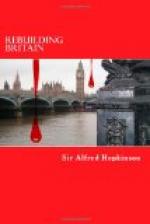Some of the methods for obtaining increased production from industry by better conditions of labour leading to more effective efforts have been discussed in another chapter; the question of obtaining increased output from the land so as to produce a larger amount of food for home consumption will be mentioned in a subsequent chapter dealing with reconstruction or reform relating to agriculture. Improved forestry may be regarded as a branch of the same subject.
With regard to expenditure, it will be incumbent on all classes to act rigorously so as to prevent waste, but it is not to be expected that the national expenditure as a whole can be greatly reduced as compared with the pre-War standard. The expenditure of certain classes of people might, of course, be greatly reduced without any injury to healthy life or development or in any way impairing real efficiency or even affecting their happiness; but as regards the majority this is not so. The conditions of life of the working classes, especially as regards such matters as housing, require to be improved. It is a wiser expenditure, not a reduction in expenditure, that must be the aim for them. The expenditure on drink is, of course, unnecessarily large, and in many cases absolutely detrimental, and a reduction in this respect is required for national well-being. The manner of dealing with the question must be the subject of separate consideration; but it is a remarkable fact that, though no evil has been more prominent, though for more than half a century no subject has provoked more discussion, though none has been the object of more organised attempts at reform, in none has so little of value been done by State action or legislation, at least until the establishment of the Board of Control during the War.
A second source of saving would be to prevent the waste of food which goes on in all classes. It is not only that food is actually thrown away, but that too little attempt is made to choose and to use the healthiest and most nutritious forms of food, and there is an indisposition to try any unaccustomed form of food. If one were asked what would be the most useful practical reform at the present time, probably the best answer would be, “Promote more general use of oatmeal porridge.” Attention to the best choice and use of food would do much to make a healthy nation, and at the same time effect a saving in expenditure. “Grow more oats and eat them” would be a wise precept for the nation to follow. With that, an effort must be made to secure a fuller supply of milk at lower prices. This is vital for the welfare of the coming generation. The cost of transport and of distribution of milk might be reduced by better organisation.




